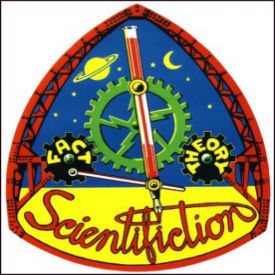 With the start of the new year, it’s time to return to our growing list of the Greatest Science Fiction Novels of All Time.
With the start of the new year, it’s time to return to our growing list of the Greatest Science Fiction Novels of All Time.
Our list is not based on personal opinion or preference, rather it is based on objective evidence. The primary evidence we draw on for our list are the awards and nominations that a novel has received. We also consider the novel’s commercial success and cultural impact.
Many of the great science fiction novels were published before the creation of many awards, forcing us to rely on other evidence of greatness. In these cases, we place a stronger emphasis on the influence the novel has had within the industry as well as its social impact.
Our list will continue to grow, and it may eventually include all of your favorites. Before we get on with the latest entry, let’s revisit our growing list of the greatest science fiction novels of all time. Please keep in mind that these novels appear in no particular order.
The Greatest Science Fiction Novels of All Time
- Rendezvous on Rama by Arthur C. Clarke (Best Novel Awards: Hugo 1974, Nebula 1973, Locus 1974, Campbell 1974, British Science Fiction Association 1973, Jupiter 1974, Seiun 1980)
- Gateway by Frederik Pohl (Best Novel Awards: Hugo 1978, Nebula 1977, Locus 1978, Campbell 1978)
- The Dispossessed by Ursula K. Le Guin (Best Novel Awards: Hugo 1975, Nebula 1975, Locus 1975, Jupiter 1975; Nominations: Campbell 1975)
- Dune by Frank Herbert (Best Novel Awards: Hugo 1966, Nebula 1966; Nominations: Hugo 1964 for Dune World)
- Neuromancer by William Gibson (Best Novel Awards: Hugo 1985, Nebula 1985, Philip K. Dick 1984; Nominations: Campbell 1985, British Science Fiction 1984)
- Startide Rising by David Brin (Best Novel Awards: Hugo 1984, Nebula 1984, Locus 1984)
- Ancillary Justice by Ann Leckie (Best Novel Awards: Hugo 2014, Nebula 2014, British Science Fiction 2013, Arthur C. Clarke 2014; Best First Novel Awards: Locus 2014, Kitschies Golden Tentacle 2013; Nominations: Philip K. Dick 2013, James Tiptree, Jr. 2013, Compton Crook 2014, Campbell 2014)
- The Forever War by Joe Haldeman (Best Novel Awards: Hugo 1976, Nebula 1975, Locus 1976)
- Frankenstein; or, The Modern Prometheus by Mary Shelley
- Twenty Thousand Leagues Under the Sea by Jules Verne
- The Left Hand of Darkness by Ursula K. Le Guin (Best Novel Awards: Hugo 1970, Nebula 1970, James Tiptree, Jr. Retrospective Award)
- Where Late the Sweet Birds Sang by Kate Wilhelm (Best Novel Awards: Hugo 1977, Locus 1977, Jupiter 1977; Nominations: Campbell 1977, Nebula 1976)
Blackout/All Clear by Connie Willis
Title: Blackout/All Clear
Author: Connie Willis
First Year Published: 2010
Awards:
- Nebula Award for Best Novel 2010
- Hugo Award for Best Novel 2011
- Locus Award for Best Science Fiction Novel 2011
Nominations:
- John W. Campbell Memorial Award 2011
Connie Willis wrote two halves of a novel Blackout and All Clear that were later combined into one printing. The collected novels Blackout/All Clear received the Nebula, Hugo, and Locus awards.
Connie Willis is one of the truly Grand Masters of science fiction, and this novel is one of the many stones that lays the foundation for her greatness.
Blackout/All Clear is a true masterpiece that combines the art of historical fiction with the mind twisting pathways of science fiction. The novel features a group of historians from the future who travel back in time to learn the details of events during World War II.

Connie twists the time travel concept in her own way by driving away from the paradox theme of many time travel novels. She does this by imposing rules on time travel. The rules force the time travelers to appear in the past at locations and times that are close to their choosing, but not directly on the mark.
The shifting of their destination prevents the paradox, but it also serves to unsettle the characters, leaving them unprepared for their arrival and circumstances. Each character must cope with the new time and place they discover, while trying to find their way back to the future.
Along the way, Connie paints an amazing portrait of humanity during World War II. She breathes life into the people of the war, showing heroism and bravery from even the most unassuming of characters.
Blackout/All Clear will make you laugh, make you cry, make you think, and entertain you all the while. It is truly one of the greatest science fiction novels of all time. If you have not read it yet, you should make sure it finds its way onto your reading list.
R.K. Troughton works as an engineer, developing tomorrow’s high-tech gadgets that protect you from the forces of evil as well as assist your doctor in piecing you back together. His passion for science fiction and fantasy has been fed through decades of consumption. He is the author of numerous science fiction and fantasy screenplays and short stories, and his debut novel is forthcoming. His articles appear every Wednesday morning on Amazing Stories.










